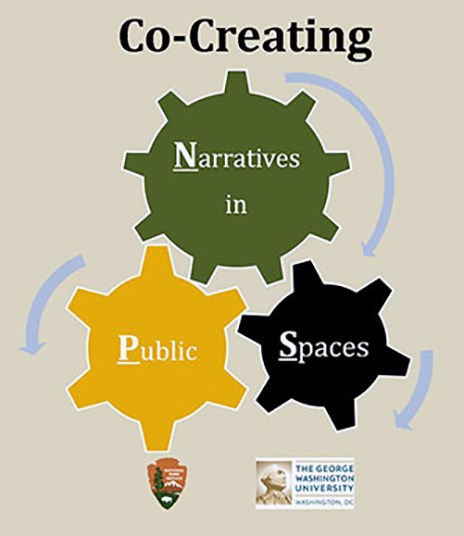Last updated: February 15, 2017
Article
Co-Creating Narratives in Public Spaces

What are these resources?
These are a series of recordings that present different aspects of creating interpretive narratives in public spaces. They can be viewed and used individually or together.The Bison: Going Beyond the Symbol (2 hrs 2 min):
Webinar. The bison is integral to the symbolism of the National Park Service, and yet it also represents a complex history of environmental devastation and Native American subjugation. This Livestream event unpacks the symbol of the bison and explores how new collaborations are working to heal the wounds of the past. Speakers: Glenn Plumb, Chief Wildlife Biologist, Wildlife Conservation Branch, NPS; Reed Robinson, Superintendent, Devils Tower National Monument, NM; Albert LeBeau, Cultural Resources Program Manager, Effigy Mounds National Monument, NM; Jim Stone, Executive Director, Inter Tribal Buffalo Council; and Trudy Ecoffey, Tribal Liaison, Pine Ridge Natural Resources Conservation Service, US Department of Agriculture.
Relevancy, Diversity, and Inclusion: Expanding National Park Service Narratives (1 hr 55 min):
Webinar. The National Park Service has a responsibility to tell the diverse stories that shaped our nation’s past and reflect our contemporary society. By co-creating narratives in public spaces, these stories can become inherently more compelling and engaging and will help to broaden the audience for our National Parks. Speakers include Michael Reynolds, NPS Workforce, Relevancy & Inclusion; Julia Washburn, NPS Interpretation, Education, and Volunteers; Steve Pitti, Yale University; Milton Chen, The George Lucas Educational Foundation. Moderated by Laura Schiavo, Museum Studies Program, George Washington University.
Co-Creating Narratives in Public Spaces:
This is a series of recordings documenting the two-day workshop, Co-Creating Narratives in Public Spaces.
- Welcome and Introductions (20 min)
- Keynote (56 min). Faye V. Harrison, PhD, Professor of African American Studies and Anthropology at the University of Illinois Urbana-Champaign
- Exploring “the Frontier” as a Site of Contact (1 hr 58 min) How do we convey the complicated and contest-ridden stories of western expansion in ways that are inclusive of various perspectives and not simplified stories of the “conquest of virgin land?” Panelists: Paul Chaat Smith, Associate Curator, National Museum of the American Indian; Daniel Maher, PhD, Assistant Professor of Sociology and Anthropology, University of Arkansas Fort Smith; Lisa Conrad Frost, Superintendent, Fort Smith National Historic Site, NPS; Ravis Henry, Park Ranger, Canyon de Chelly National Monument, NPS
- Interpreting Sites of War (1 hr 53 min). What does it mean to commemorate battlefields as hallowed ground and how can a site of war tell a range of stories? Panelists: Alan Spears, Legislative Representative/Historian, National Parks Conservation Association; Alisa Lynch, Chief of Interpretation, Manzanar National Historic Site, NPS; Karen Wilde, Tribal Liaison, Sand Creek Massacre National Historic Site, NPS; Tim Good, Superintendent, Ulysses S. Grant National Historic Site, NPS; John Hennessey, Chief Historian/Chief of Interpretation, Fredericksburg and Spotsylvania National Military Park, NPS
- Closing Discussion (54 min)
- Day 2 Opening Remarks (15 min). Dean Ben Vinson III, Dean of the Columbian College of Arts & Sciences, George Washington University
- Broadening the Story (2 hr 23 min; starts at time stamp 16 minutes). What is the role and responsibility of our nation’s major cultural institutions when it comes to telling stories as national stories? Panelists: Jesse Nickelson, Ed.D., Director, Youth and Community Initiatives, Holocaust Memorial Museum; Paul Gardullo, Museum Curator, National Museum of African American History and Culture; Claudine Brown, Assistant Secretary for Education and Access, Smithsonian Institution; Joy Kinard, Central District Manager, National Capital Parks East, NPS; Ruben Andrade, Superintendent, Cesar E. Chavez National Monument, NPS
- Being Better Citizens (1 hr 59 min). How can sites best use their unique cultural assets to work toward cultivating an informed citizenry and ultimately contribute to the healing of the community? Panelists: Kelli English, Chief of Interpretation, John Muir National Historic Site, Port Chicago Naval Magazine National Memorial, Rosie the Riveter/WWII Home Front National Historical Park, NPS; Katherine Kane, Executive Director, Harriet Beecher Stowe Center; Annie Polland, Vice President of Education, The Tenement Museum; Donna Graves, Independent Public Historian.
- Closing Panel (Part 1: Pre-Activity; 57 min) (Part 2: Post-Activity; 41 min). How does a large Federal institution effectively share authority with general populaces who have diverse backgrounds, but also diverse interests and opinions? Panelists: Julia Washburn, Associate Director, Interpretation and Education, NPS; Mickey Fearn, Professor of Practice, College of Natural Resources, North Carolina State University; Naomi Torres, Superintendent, Juan Bautista de Anza National Historic Trail, NPS; Franklin Odo, Co-chair of the Asian American/Pacific Islander Scholars Expert Panel of the National Park System Advisory Board.
- Closing Remarks (30 min)
